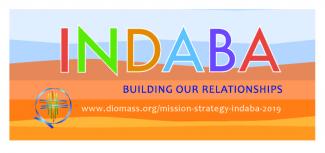Last year's Diocesan Convention adopted a mission strategy implementation plan that includes "developing opportunities for teams from congregations to visit other congregations, sharing worship and learning about one another."
Since then, a Diocesan Council working group has studied and recommended Indaba as a format for addressing that diocesan goal. Indaba is a model for purposeful conversation, arising out of the South African context, which has been used throughout the Anglican Communion.
"It was the Anglican Communion Lambeth Conference in 2008 that first adopted it for the bishops, at time when there was a fair amount of controversy, as a method for deliberating with each other and becoming better acquainted with each other's contexts for being Anglican Christians in the world and to try to find points of commonality even among difference. It was very successful, and that led Anglican dioceses to pick up on what the bishops had done and try to take it further into the lives of dioceses and parishes," the Rev. Marilyn McMillan, a deacon serving at St. David's Church in South Yarmouth and a member of the diocesan Indaba working group, explained in an interview.
"What's specific to Massachusetts about our use of this method is that we had already identified in the work of developing our mission strategy that we needed across this amazingly diverse diocese of wonderfully active people a way of building relationships and appreciation and understanding across parishes. It's actually a combination of conversation and presence," McMillan said.
She had the opportunity to experience the process while doing field education in the Diocese of New York at St. Mary's in Manhattanville. The parish hosted Indaba teams from upstate and shared with them the experience of making sandwiches and going out with shopping carts to distribute them throughout the city neighborhood.
"I thoroughly enjoyed that day and got a real understanding of the possibilities for getting acquainted with the different contexts that parishes are in, and so I became an enthusiast," McMillan said.
"One of the things I've noticed is that the skills that get developed as part of going through an Indaba process are the same kind of skills that are needed in a lot of different settings. It's very much relational muscle building," she said.
All worshiping communities of the diocese are invited and encouraged to participate in what is being launched this fall as Massachusetts Indaba 2019. Here's how it will work:
Each interested congregation or community needs to sign up online by Friday, Nov. 30 and then designate a four-person Indaba team. All the Indaba teams will attend a kick-off gathering and orientation on Saturday, Jan. 12, 2019. Each Indaba team will be assigned to partner with two teams from other deaneries. Three weekends in March, June and October of 2019 have been scheduled as Indaba Encounters. On each of those weekends, one of the three Indaba partner teams will host the other two partner teams, including overnight accommodations in members' homes. All the teams will gather for a closing celebration in October 2019 to share their experiences and hopes for the future.
Indaba is about relationship building and skill building, and it is being introduced to the diocese at a time in society when listening and being heard is more important than ever, Louise Gant said in an interview. She is a member of the Church of the Holy Spirit in Mattapan and a co-convener of the Indaba working group. She also served on last year's Mission Strategy Implementation Team.
"What really drew me to Indaba was not only the relationship-building aspect but also the fact that the focus is not on solving a problem or reaching some outcome or changing someone's mind about something on which you might have a different opinion or perspective. It's really more, to me, about sharing and listening in a way that you might be able to put yourself in another person's space. It's a process for making sure that everyone gets to be heard. I think that's what many of us are seeking, to be heard," Gant said.
She said that the method can be scaled up or down to be used in a variety of settings, so that once a congregation has experience with it, Indaba becomes "another tool to use in relationship building."
It ought to be fun, too, she said. "Part of the experience will be to get to know one another and share some fun times, share a meal together and allow some free time to use in whatever way helps to deepen relationships," she said.
"My hope is that the congregations that participate in it will have experienced a new way, another way of getting to know one another and that this actually has answered some of the prayer of those who were looking for a way to deepen relationships," Gant said. "In particular there were those who really called for that in the development of the mission strategy, during the listening phase. My hope is that they would participate in this and that they would gain something from it, a stronger sense of community within our diocese."
Find more information on Massachusetts Indaba 2019 and the online registration link here. Find the full diocesan mission strategy here.
--Tracy J. Sukraw

